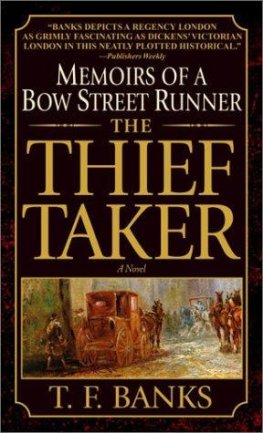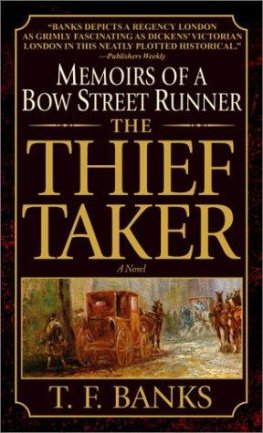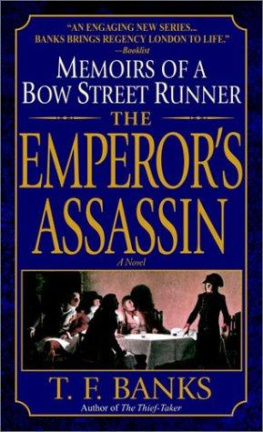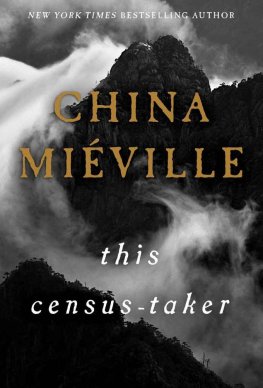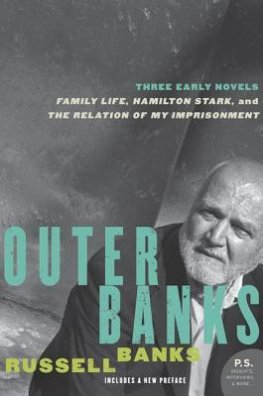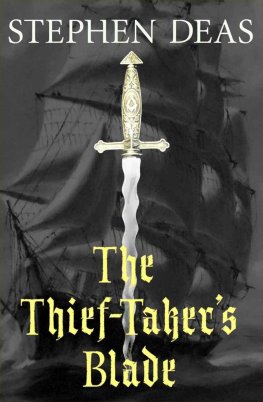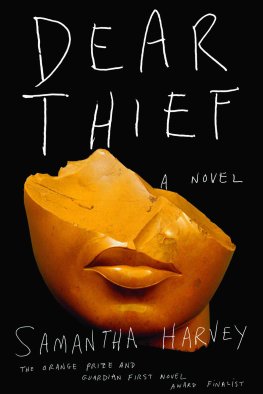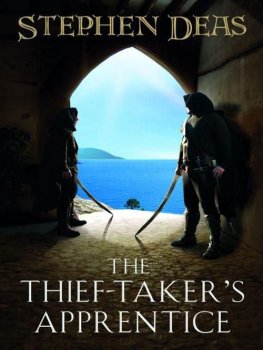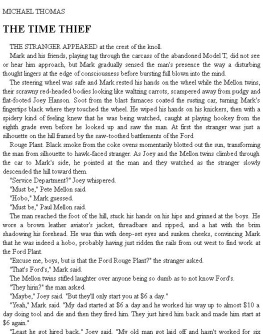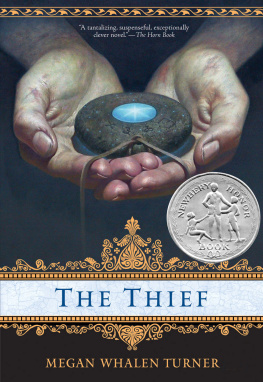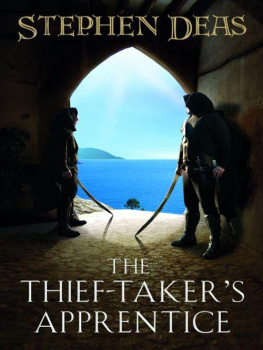T.F. Banks - The Thief-Taker
Here you can read online T.F. Banks - The Thief-Taker full text of the book (entire story) in english for free. Download pdf and epub, get meaning, cover and reviews about this ebook. genre: Detective and thriller. Description of the work, (preface) as well as reviews are available. Best literature library LitArk.com created for fans of good reading and offers a wide selection of genres:
Romance novel
Science fiction
Adventure
Detective
Science
History
Home and family
Prose
Art
Politics
Computer
Non-fiction
Religion
Business
Children
Humor
Choose a favorite category and find really read worthwhile books. Enjoy immersion in the world of imagination, feel the emotions of the characters or learn something new for yourself, make an fascinating discovery.
- Book:The Thief-Taker
- Author:
- Genre:
- Rating:3 / 5
- Favourites:Add to favourites
- Your mark:
- 60
- 1
- 2
- 3
- 4
- 5
The Thief-Taker: summary, description and annotation
We offer to read an annotation, description, summary or preface (depends on what the author of the book "The Thief-Taker" wrote himself). If you haven't found the necessary information about the book — write in the comments, we will try to find it.
The Thief-Taker — read online for free the complete book (whole text) full work
Below is the text of the book, divided by pages. System saving the place of the last page read, allows you to conveniently read the book "The Thief-Taker" online for free, without having to search again every time where you left off. Put a bookmark, and you can go to the page where you finished reading at any time.
Font size:
Interval:
Bookmark:
T.F. Banks
The Thief-Taker
.
The death of Halbert Glendinning will, in my mind, always be coupled to the great battle fought at Waterloo, and the extraordinaary celebration within the city of London that June of 1815.
At about the same time also an odd little event occurred that I mention, not by way of name-dropping, but only because it, too, is forever linked in memory to the Glendinning affair. I had the good fortune to meet the famous Lord Byron, and under circumstances that you will hardly credit, for we did not meet at a salon-Bow Street Runners were not welcome at such gatherings. No, we met at a club I frequented: Gentlemen John Jackson's boxing club. Byron was a devotee of the manly arts, and we actually stood toe to toe and traded some pretty fair blows for a time. That was before the great scandal broke that drove the poet from England forever.
But I am getting away from my story. I recall this meeting because it was after our contest at Jackson's that a boy came to fetch me about this fellow Glendinning. It seems he'd arrived at a nearby house in a hackney-coach. All I knew about him then was that he hadn't paid his fare, and that he was dead.
But it turned out he was a poet, too, of sorts.
-Henry Morton, The Memoirs of a Bow Street RunnerChapter 1
Morton had all but finished dressing, and was basking in the glow of warmth and well-being, albeit moderated by a few stinging bruises, that followed his remarkable evening at Jackson's.
Mr. Morton sir? a voice said breathlessly.
Morton looked up to find a boy, gasping in the doorway as though in the throes of an asthmatical convulsion.
Henry Morton, yes.
I've run all the way, sir the child managed. 'Tis Mrs. Malibrant. Asks that you come directly. A few desperate breaths were needed. I'm to say 'tis most urgent, sir. Most terrible urgent.
Morton tossed aside a towel. Nothing has befallen Mrs. Malibrant, I hope?
Oh, no, Mr. Morton. 'Tis the gentleman, sir. The young gentleman who just arrived at Lord Arthur's. The boy straightened a little and shook his head. He appears to be dead, sir. Most thoroughly dead.
It was but a short walk from Jackson's in Bond Street to their destination in Portman Square, but even so, Morton's long, purposeful stride soon had the boy out of breath again, precluding conversation. Following along the dimly lit street came the hollow echo of a tired horse and tradesman's cart, the owner shuffling numbly beside. A pile of cobbles and rubble forced Morton and the boy outside the line of iron posts that protected unwary pedestrians from street traffic. Here they found their footing with care in the foul street.
At this hour, near to ten Morton guessed, Bond Street was quiet but not empty, the shop windows dark, the signs over doors unreadable in the gloom.
He was trying to remember in what manner Arabella had said she was engaged that night. Was she not on-stage this evening? He was sure she'd said she was, and Morton had a near-infallible memory. Very odd.
The gateman who protected the privacy of the occupants of the Square took notice of Morton's gilt-topped baton and let them through. Ev'ning, Constable, he said, tipping his cap. The disturbance be down there to the right, nigh on Portman House.
Along the line of elegant Greek Revival town houses, Morton could see one with its doors open, light and guests spilling out into the street, where carriages clustered in a throng. Rather too early for a dinner party to end, Morton thought, and as he drew closer saw that there was little gaiety in the faces.
The boy whisked him past the butler, who had barely an instant to cast a disapproving glare in Morton's direction. He was let into a small sitting-room, and there two gentlemen stood over a third who lay very still on a divan. A pleasantly greying man looked up, his face grim and pale.
Henry Morton. Bow Street. Mrs. Malibrant sent for me.
The man nodded. Arthur Darley.
Hadn't Arabella mentioned a Lord Arthur a few times? She had so many admirers it was difficult to keep them straight, and Morton usually didn't try, finding them an ineffectual lot. Though Lord Arthur was imposing enough. No fool, Morton surmised, and taking a man's measure was part of Morton's trade.
Doctor? Lord Arthur asked the second man, who glanced sourly over his shoulder.
Well, I'm sorry to say it, sir, the other replied, but this young man is beyond my powers to help. Beyond anyone's, in fact. He smells powerfully of strong drink and has aspirated his own vomitus.
Morton peered past the doctor. The dead man, who could only have attained this state very recently, still had some colour in his face. His lips are not terribly blue for a man who has suffocated, Morton offered.
The doctor turned on him, eying him rather viciously. And you are a medical man, sir?
Morton held his preferred response in check. No, I am a Bow Street man, he said, but I've seen a few corpses in the course of my duties. His windpipe is blocked?
I have seen a few corpses in my time, as well, sir, the little man said, his tone mocking and indignant. I served with Wellesley in Spain.
Army surgeon? Well, that would make you an authority on men drinking themselves to death. You don't mind if I have a look, do you? Wellesley, indeed! As though this small man were a familiar of the Duke of Wellington's.
The doctor stood his ground a moment more, then gave Darley a stiff bow. I have given my opinion, he said haughtily. I bid you gentlemen good evening.
Thank you for your assistance, sir, Darley said, and accompanied him to the door.
Morton could see the dead man clearly for the first time: young, perhaps twenty-six or -seven, not strongly formed but hardly effete. He guessed him to be of good height, perhaps three inches shorter than Morton himself. His hair was straw-coloured. His eyes had been closed but they were likely blue. The rather square mouth was now rapidly turning to greyish-purple. His elegant evening clothes, fashionably dark, were covered in vomit. It even matted his hair.
Morton breathed in the familiar smell of death, but there was something more as well. Sickly sweet. He bent over, braced himself, and pressed on the man's chest, breathing in through his nose as he did so. He gagged and pulled a handkerchief from his pocket, covering his mouth. His eyes watered, but the contents of his own stomach stayed where they belonged.
Covering his fingers with his handkerchief, he distended the man's lips, then pulled on the teeth to open the jaw. As he thought. He wiped his hands energetically. There were no signs that the young man had been assaulted. His clothes, though soiled, were not torn or even appreciably askew. Morton gently turned the man's head, which rolled heavily to one side. No marks or signs of a blow. His hands and forearms bore no bruises or contusions. He had not defended himself.
A real doctor would have to make an examination, but Morton had seen enough to convince him. Quickly he went through the man's outer pockets and fob. A watch, some coins, a small ring of keys. He opened the jacket.
What are you finding, Mr. Morton? Darley had returned from seeing the doctor out, and now eyed the thief-taker rather suspiciously.
Morton's fingers encountered a small sheet of folded paper in an inner pocket. He stood up, turning to Darley.
Nothing unexpected. To be honest, Lord Arthur, I am not sure why Mrs. Malibrant sent for me. I do not know how this unfortunate gentleman met his end but there are no signs of foul play. He doesn't appear to have been robbed. Though, at the risk of offending your friend the surgeon, I do not think he suffocated. Can you tell me who he is and the circumstances in which he was found?
Arabella let herself in at that moment, and both men bowed to her. She was dressed in a gown of green silk that seemed to reflect the colour of her eyes, which were, Arabella liked to say, the hue of jade. Porcelain-pale skin and, about her lovely face, a cloud of cumulous red hair. Arabella Malibrant did not go unnoticed in a crowd.
Font size:
Interval:
Bookmark:
Similar books «The Thief-Taker»
Look at similar books to The Thief-Taker. We have selected literature similar in name and meaning in the hope of providing readers with more options to find new, interesting, not yet read works.
Discussion, reviews of the book The Thief-Taker and just readers' own opinions. Leave your comments, write what you think about the work, its meaning or the main characters. Specify what exactly you liked and what you didn't like, and why you think so.

